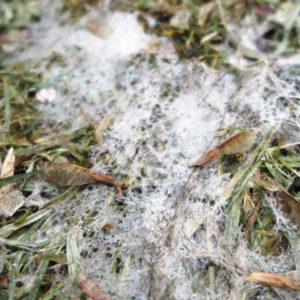Posted on November 30th, 2018
With cold temperatures, chilling winds, and snow right around the corner, it begs the question: Can snow damage my lawn? Before we answer this question, it is important to note a few things. First, grass stores essential nutrients in their root systems during the fall months. Second, when the weather gets consistently cold, grass enters dormancy and relies heavily on those nutrients for survival. So, when the grass is dormant, is snow good or bad? The answer: both. Here are some pros and cons to snow on your lawn.
Snow provides protection from your grass being exposed to cold, winter winds. When exposed, your grass is at risk of, “transpiration.” Transpiration is where the moisture is removed from the grass as a result of the freezing cold winds. Eventually, the grass will completely freeze, which will break the blades in half and ultimately kill the roots. Thankfully, the snow works as a shield from the winds, which allows the grass to continue to store moisture and other important nutrients.

Snow mold is a cold-weather fungus that occurs under the snow. Damage caused by snow mold is usually not seen until the weather begins to warm up and/or the snow melts. If leaves and lawn debris are left on your lawn prior to the first snow, you are at risk of getting snow mold. These things combined with the moisture that comes from the snow may bring those unwanted gray and pink spots in your grass come springtime.
Melting snow can be beneficial to your lawn, since it operates as a “slow-release watering method.”
As previously mentioned, a blanket of snow can provide protection for your grass. However, if the snow gets piled up in one specific area, it can cause damage. While building a snowman is a fun winter activity, the weight causes significant stress on the grass and can result in the crown breaking, and roots dying. Snowplows can cause a similar issue, especially if they push the snow into the same area over and over again.
One of the main ingredients (and most important) in fertilizer is nitrogen. Nitrogen aids in the overall health, and growth of your grass. According to Mosaic Crop Nutrition, “Nitrogen is one of the most widely distributed elements in nature since it is the most abundant gas in the atmosphere.” A nice blanket of snow traps the nitrogen from the air and delivers it into the soil. It’s a natural fertilizer!
Where there is snow, there is salt. Salt steals moisture and other nutrients from your grass, which can result in brown patches, come springtime. When laying salt it is important to make sure it’s staying on walkways, and not going onto your lawn.
At Turf Unlimited, we offer a large variety of lawn care services to benefit you. Our professionals will provide you with a custom lawn care program to give you that healthy, green lawn you’ve always desired. Give us a call at (888) 649-9919 to hear more!